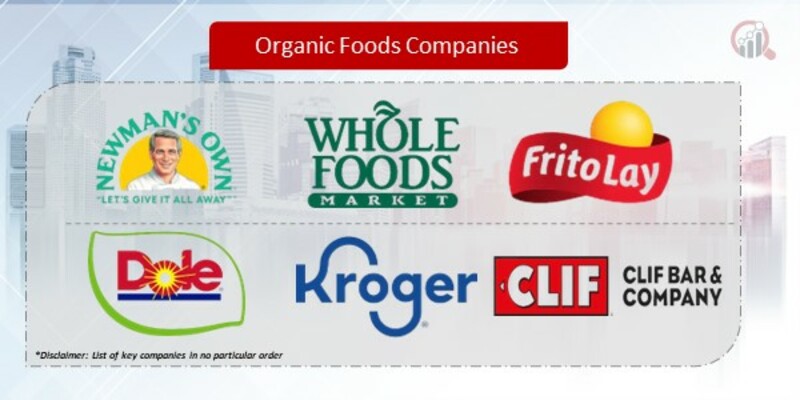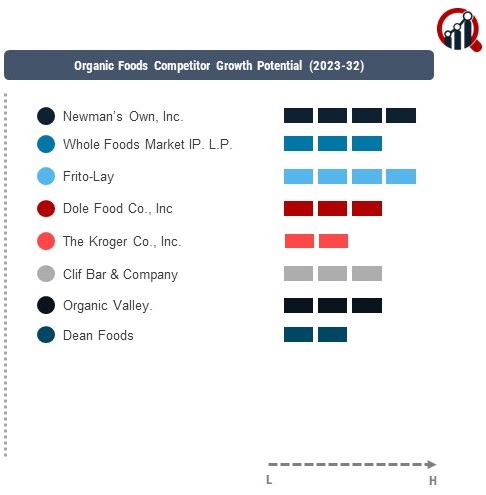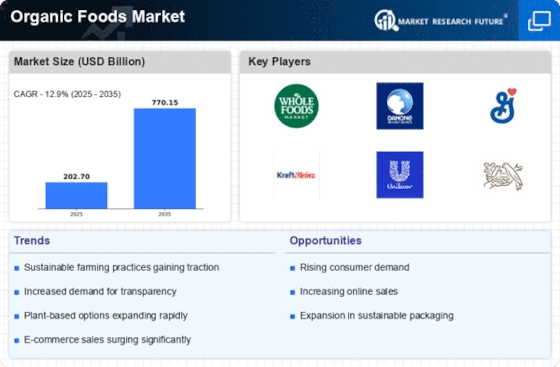Top Industry Leaders in the Organic Foods Market

Strategies Adopted by Organic Foods Key Players
The competitive landscape of the Organic Foods Market is characterized by key players that significantly influence the production, distribution, and marketing of organic food products. As of 2023, major companies playing a pivotal role in this market include Organic Valley, Nature's Path Foods, WhiteWave Foods, Nature's Best, and Hain Celestial Group.
Key Players:
Newman’s Own, Inc.
Whole Foods Market IP. L.P.
Frito-Lay
Dole Food Co., Inc.
The Kroger Co., Inc.
Clif Bar & Company
Organic Valley.
Dean Foods
The organic foods market revolve around product innovation, acquisitions, sustainability, and strategic partnerships. Product innovation is crucial, with companies investing in the development of new organic products to meet the evolving tastes and preferences of consumers. Acquisitions of other organic brands or businesses allow established players to diversify their portfolios and tap into the growing organic market. Sustainability initiatives focus on responsible sourcing of organic ingredients, reducing environmental impact, and meeting the expectations of environmentally conscious consumers. Strategic partnerships with organic farmers, retailers, and distributors contribute to increased visibility, accessibility, and supply chain efficiency in the organic foods market.
Market Share Analysis:
The organic foods market include brand reputation, product quality, pricing strategies, distribution networks, and consumer loyalty. Brand reputation plays a significant role, with consumers often choosing products from well-known and trusted organic brands. Product quality, in terms of organic certification, taste, and freshness, is crucial for building and maintaining consumer trust in the organic foods segment. Pricing strategies, whether positioned as premium or competitively priced, impact market share by appealing to specific consumer segments. Efficient distribution networks, including collaborations with retailers and online platforms, contribute to market reach and accessibility. Consumer loyalty is fostered through effective marketing, transparent labeling, and ethical sourcing practices that align with the values of organic-conscious consumers.
News & Emerging Companies:
The organic foods market has witnessed the emergence of new companies and trends responding to the growing demand for organic and sustainably produced food items. Emerging companies often focus on niche segments, such as organic snacks, specialty foods, or innovative product categories, to differentiate themselves in the competitive landscape. Additionally, advancements in organic farming practices, regenerative agriculture, and supply chain transparency have gained traction among emerging players seeking to enhance the overall sustainability of organic food production.
Industry Trends:
Industry trends in the organic foods market highlight continued commitments to sustainability, supply chain transparency, and technological innovation. Many companies are investing in sustainable farming practices, organic certifications, and reducing their carbon footprint to align with the industry's focus on environmental responsibility. Supply chain transparency efforts involve providing consumers with information about the origin of ingredients, farming practices, and processing methods to build trust and confidence. Technological innovation includes implementing digital solutions for traceability, precision farming, and supply chain optimization to enhance efficiency and meet the increasing demand for transparency in organic food production.
Competitive Scenario:
The organic foods market remains dynamic, with established players adapting to changing consumer preferences and emerging companies contributing to innovation. Market dynamics are influenced by factors such as the growing awareness of health and environmental concerns, consumer willingness to pay a premium for organic products, and regulatory support for organic farming practices. The resilience of the market is evident in its ability to evolve, with companies addressing the diverse needs of consumers seeking organic and sustainable food choices.
Recent Development
The organic foods market presents a competitive landscape shaped by key players employing diverse strategies to meet the evolving demands of consumers seeking organic and sustainably produced food items. The emphasis on product innovation, acquisitions, sustainability, and strategic partnerships underscores the industry's commitment to addressing changing market dynamics. As the market continues to evolve, companies that can successfully balance taste, transparency, sustainability, and accessibility are likely to maintain a competitive edge in the dynamic landscape of the organic foods market.

- Beta
Beta feature










